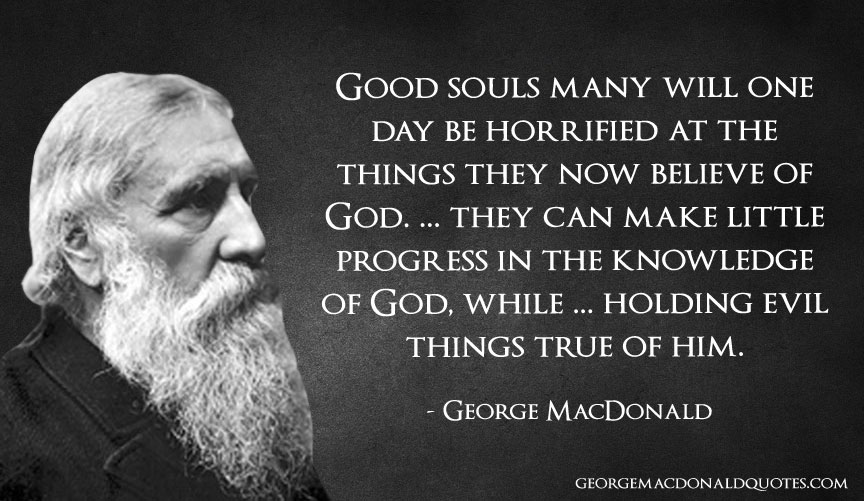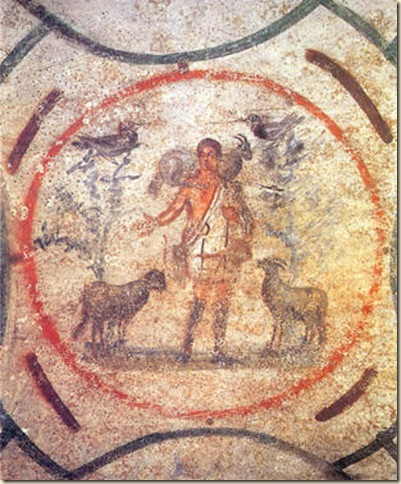The Father Who Lost Two Sons
This is about what’s normally called The Parable of the Prodigal Son. That's only one of the two sons in the parable, the younger boy. The older boy is the one—the other son—who is lost. And the point about changing the name of the parable is that the parables are almost always misnamed.
The Parable of the Lost Sheep is not about the lost sheep.
All the sheep ever did was get lost. The parable is about the passion of the shepherd who lost the sheep to find the sheep. His passion to find is what drives the parable; and consequently it isn't the Prodigal's lostness, wasting all his money on wine, women and song in the far country; and it isn't the elder brother's grousing and complaining and score keeping that stands against him. What counts in the parable is the father's unceasing desire to find the sons he lost—both of them—and to raise both of them up from the dead.
The story, of course, you know. The story begins with the father having two sons and the youngest son comes to the father and says, "Father, divide the inheritance between me and my brother." What he’s in effect saying is,
"Dear Dad, drop dead now, legally.
Put your will into effect and just retire out of the whole business of being anything to anybody and let us have what is coming to us." So the youngest son gets the money and the older brother gets the farm. And off the younger brother goes. What he does, of course, is he spends it all—blows it all—on wild living. When he finally is in want and working, slopping hogs for a farmer and wishing that he could eat what he’s feeding the pigs, he can't stand it. When he finally comes to himself he says, "You know, I've got to do something. How many hired servants of my father's are there who have bread enough to spare and I'm perishing here with hunger? I know what I'm going to do."
Almost every preacher makes this the boy's repentance. It's not his repentance.
This is just one more dumb plan for his life.
He says, "I will go to my father and I will say, ‘Father, I've sinned against heaven and before you.'" That's true. He got that one right. "And I'm no longer worthy to be called your son." Score two. He gets that one right. But the next thing he says is dead wrong. He says, "Make me one of your hired servants." He knows—he thinks he knows—he can't go back as a dead son, and therefore he says, "I will now go back as somebody who can earn my father's favor again. I will be a good worker or whatever." This is not a real repentance, it's just a plan for a life. What it is, is enough to get him started going home, and consequently when he goes home, what happens next is an absolutely fascinating kind of thing.
What happens next?
What happens next is that the father (you must remember this) is now sitting on the front porch of the farm house. The farm house doesn't belong to him anymore. The front porch doesn't belong to him. He’s sitting in the rocker that belongs to his oldest son who is now, you know, the owner of the farm. He’s sitting there and he sees the Prodigal, the younger boy, coming down the road from far away. He sees him coming. What does he do? He rushes off the porch, runs a half mile down the road, throws his arms around the boy's neck and kisses him.
Now, this is all that Jesus does with this scene. The fascinating thing in this parable is that in the whole parable the father never says one single word to the Prodigal Son. Jesus makes the embrace, the kiss, do the whole story of saying, "I have found my son." The fascinating thing also is that when the father embraces the boy who has come home from wasting his life, the boy never gets his confession out of his mouth until after the kiss, until after the embrace. What this says to you and me who have to live with the business of trying to confess our sins is that confession is not a pre-condition of forgiveness. It’s something that you do after you know you have been forgiven. Confession is not something you do in order to get forgiveness. It’s something you do in order to celebrate the forgiveness you got for nothing. Nobody can earn forgiveness. The Prodigal knows he's a dead son. He can't come home as a son, and yet in his father's arms he rises from the dead and then he is able to come to his father's side.
What happens next is that the father, saying not a word to the Prodigal, turns to the servants and says, "Bring the best robe, bring a ring for his finger and shoes for his feet, kill the fatted calf and let us eat and be merry for this, my son, was dead and is alive again. He was lost and is found." Now this is the point in the parable at which everything is going well. The dead son, the no-good Prodigal Son, is home. He has been raised from the dead by his father's embrace. He has done nothing to earn it, but now all that matters is that the father has called for the party to celebrate the finding of the lost and the resurrection of the dead.
It's the party. Every one of Jesus' parables of grace—not every one, but most of them—end with a party.
When the Shepherd finds the lost sheep, he doesn't go back to the 99, he goes home and has a party with his friends in order to celebrate the finding of the lost. The father's will to have a party is what the parable is all about. That's why you must always do, not the human race characters in the parable like the Prodigal and the elder brother, why you must always do the God character first, because it’s the God character who drives the parable.
All right, now, what we've got now is everybody dead in the parable.
The father died at the beginning, the Prodigal died in the far country: he came home dead and the father raises him. Everything is fine. And now what we've got is Jesus' genius as a storyteller. The party is in full swing, so Jesus brings back in the only person in the story left who still has a life of his own: Mr. Responsibility, Mr. Whining, Mr. Elder Brother. He comes up and hears the music and the dancing and he probably sees the waiters scurrying around with roast veal platters and everything else. And he asks one of the servants, "What is this all about? I didn't commission a party." The servant says, "No, no, your brother has come home and your father has killed the fatted calf because he received him safe and sound." And the older brother is angry and he will not go in. He will not go into the house. He is right out there in the midst of the party. He is part of the party but he will not join the party. And the next thing that happens in this: when he comes in with all this bookkeeping he says, "Look," to his father, "all these years I served you and I never broke one of your commandments and you never even gave me a goat that I could make merry with my friends. But when this your son (notice he doesn't say, this my brother) cuts off his relationship, this your son has wasted your substance with riotous living, has wasted your substance with harlots, when this son comes home you kill the fatted calf!"
I think that one of the things you could do with this is make up a speech for the father.
The father goes out in the courtyard to plead with the older son. He goes out there in order to find him as he is and to raise him from the dead. He never gives up on any of them. He says to him, "Look, Arthur (let’s call the older brother Arthur), what do you mean I never gave you a goat for a party? If you wanted to have a great veal dinner for all your friends every week in the year, you had the money and the resources. You owned this place, Arthur. You have the money and the resources to have built 52 stalls and kept the oxen fattening as you wanted them to come along, but you didn't. Why didn't you do that, Arthur? Because you're a bean counter, because you're always keeping track of everybody else. That's your problem, Arthur, and I have one recipe for you." (The father is pleading with this fellow to come out of the death of bookkeeping.) He says, "I have one recipe for you, Arthur. That is, go in, kiss your brother, and have a drink. Just shut up about all this stuff because, Arthur, you came in here already in hell, and I came out here in this courtyard to visit you in the hell in which you were."
This is the wonderful thing about this parable, because it isn't that there was a Prodigal Son who was a bad boy and who, therefore, came home and turned out to be a good boy and had a happy ending. Then the elder brother—you would think Jesus, if he was an ordinary storyteller, would have said, "Let's give the elder brother a rotten ending." He doesn't. He gives the older brother no ending. The parable ends with a freeze frame. It ends like that with just the father, and the sound goes dead—the servants may be moving around with the wine and veal—but the sound goes dead and Jesus shows you only the freeze frame of the father and the elder brother. That's the way the parable has ended for 2,000 years.
My theory about this parable is that if, for 2,000 years, he has never let it end, then you can extend that indefinitely, that this is a signal, an image of the presence of Christ to the damned. When the father goes out into the courtyard, he is an image of Christ descending into hell; and, therefore, the great message in this is the same as Psalm 139, "If I go down to hell, You are there also." God is there with us. There is no point at which the Shepherd who followed the lost sheep will ever stop following all of the damned. He will always seek the lost. He will always raise the dead. Even if the elder brother refused forever to go in and kiss his other brother, the Father would still be there pleading with him. Christ never gives up on anybody. Christ is not the enemy of the damned. He is the finder of the damned. If they don't want to be found, well there is no imagery of hell too strong like fire and brimstone and all that for that kind of stupidity. But nonetheless, the point is that you can never get away from the love that will not let you go and the elder brother standing there in the courtyard in his own hell is never going to get away from the Jesus who seeks him and wills to raise him from the dead.





